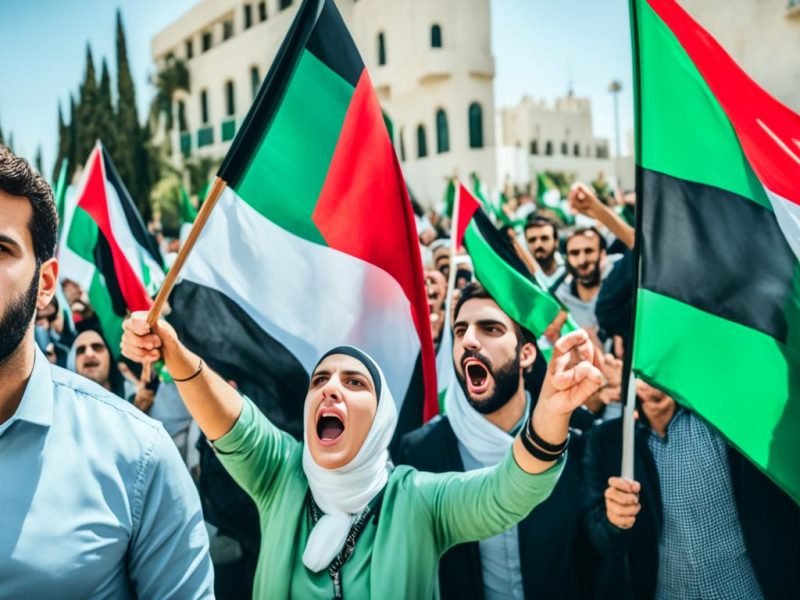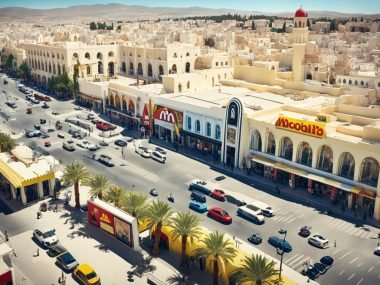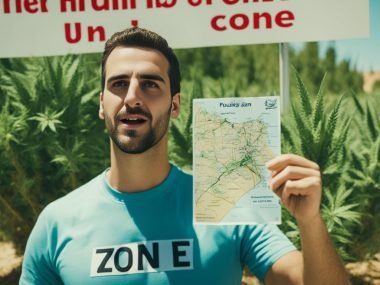I often think about how Tunisia feels about Hamas. This country is known for backing Palestinian causes. It’s interesting to look at Tunisia’s actions and words towards Palestine. These include public protests and political speech. They show Tunisia’s complex ties with Hamas and its place in Middle East politics.
When protests break out over Gaza, Tunisia stands united for Palestine. Yet, tensions brew inside the country. President Kais Saied doesn’t want ties with Israel. This choice has led to disagreements, especially after he gained more power. Tunisia’s foreign policy is a mix of supporting Palestine and dealing with its own views on Western influence.
Key Takeaways
- Tunisia’s steadfast solidarity with Palestinian causes raises questions about its relations with Hamas.
- Political and public actions, such as anti-Israel protests, embody Tunisia’s alignment with the Palestinian cause.
- Legislative moves in Tunisia aim to criminalize normalization with Israel, indicating its foreign policy stance.
- Internal opposition to President Kais Saied reflects a nation divided on its strategies toward Western influence.
- A nuanced exploration of Tunisia’s middle ground in international diplomacy reveals its solidarity and regional political manoeuvring.
The Political Pulse: Tunisia’s Stance on Hamas Amid Regional Tensions
Tunisia’s government has taken a clear stand on Hamas, causing a buzz in regional politics. The country shows unity in supporting Palestine, seen in both leaders and the people. This strong feeling reflects a national agreement on Palestinian rights.
President Kais Saied, with the Foreign Minister, has spoken out against Israeli actions. They have done this at the UN and in the Arab League meetings.
Their strong words show solid support for Hamas in Tunisia. This feeling is strong on the streets of Tunisia too.
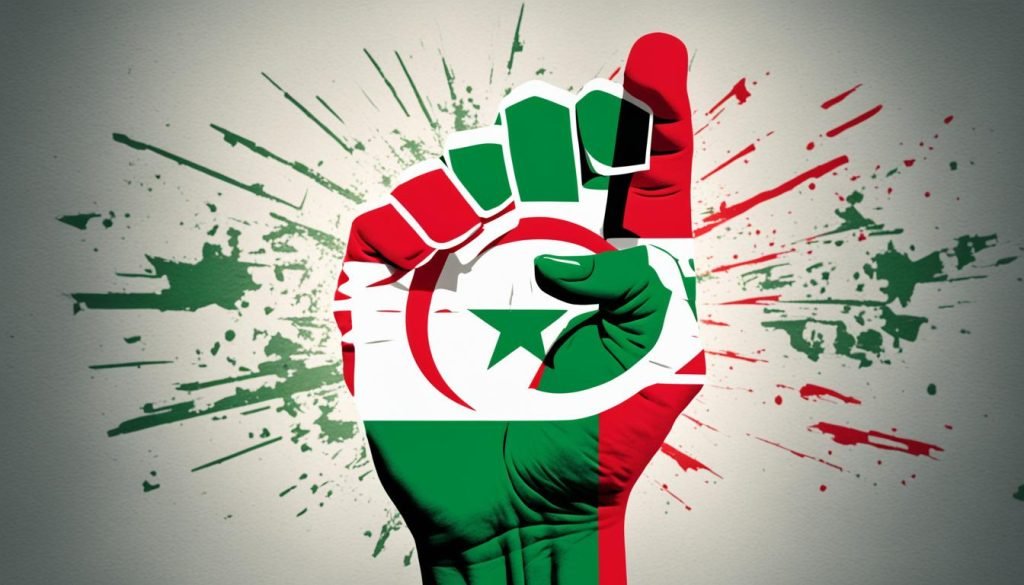
Many Tunisians have protested to show their solidarity with Palestine. They follow the government’s firm stance against normalizing ties with Israel. These protests and legal steps aim to penalize any normalization with Israel.
Let’s look closely at Tunisia’s position on Hamas:
- Unified condemnation of Israeli actions by the government and people.
- Legislative efforts against normalization with Israel, showing active involvement.
- Widespread public protests align with government’s disapproval of Israeli policies towards Palestine.
Tunisia’s actions and unity on Palestine issues are clear. Despite pressures, their stance places Tunisia uniquely in regional politics. The world will keep a close eye on how Tunisia handles these challenges.
Does Tunisia Support Hamas? Understanding the Complex Relations
Tunisia’s ties with groups like Hamas are complex. They come from history, public opinion, and laws. Tunisia supports Palestinian freedom in the Middle East.
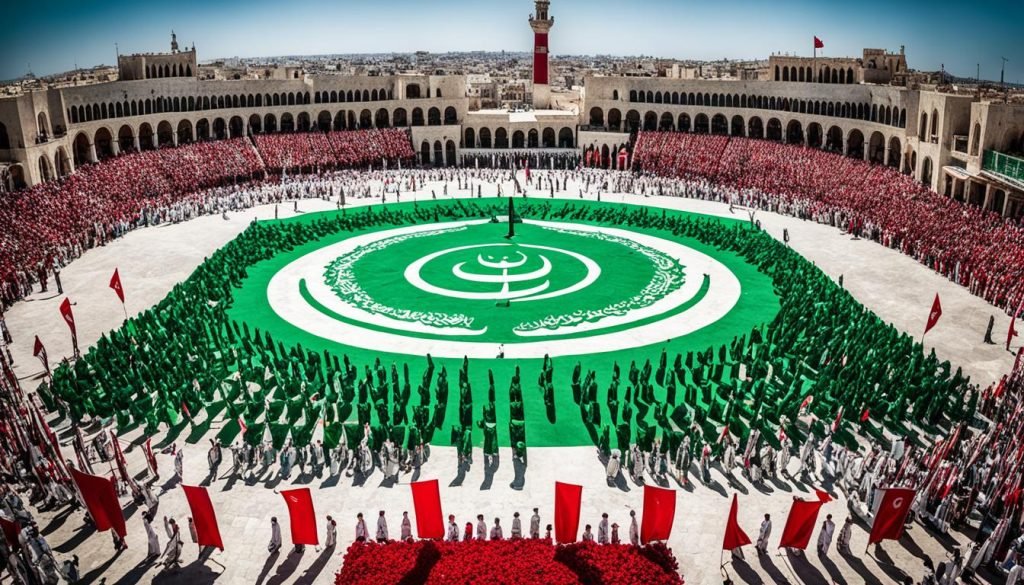
Historical Context of Tunisia-Hamas Relations
Tunisia has backed Palestinian groups, including Hamas, for many years. It showed historical support for Palestine by hosting the PLO leaders in the 1980s. This created a strong Tunisia-PLO relationship.
Tunisian Public Opinion and Legislation Affecting Hamas
In Tunisia, people really support Palestinian causes. They show this through big protests and events. Laws have been made to criminalize making peace with Israel. This shows they stand with Tunisia’s stance against Israeli occupation, like Hamas does.
President Kais Saied’s Comments and International Diplomacy
President Kais Saied speaks up for Palestine. He calls making peace with Israel “high treason.” His words are part of Tunisia’s international diplomacy. Tunisia aims to help Palestine. It’s against making peace with Israel, like Hamas’s international diplomacy efforts.
Tunisia’s Domestic Policy and the Impact on Middle East Alliances
Tunisia is facing tricky times at home and abroad. The way it balances government oversight and civil society’s quick actions is key. This shapes its role in the Middle East, especially on issues like restrictive NGO legislation and Palestinian liberation.
Civil Society’s Response to Tunisian Legislation on NGOs
Tunisian civil society is at a big turning point. It’s facing tough new rules from the government. These rules could change how groups can operate and speak out.
Many groups are pushing back hard. They say this will hurt NGO freedom in Tunisia. These groups have helped a lot with human rights and other important work.
The Balance of Upholding Human Rights and Regional Politics
Finding the right balance is getting tougher for Tunisia. Supporting human rights and regional politics at the same time is hard. It backs moves like Palestinian freedom but then limits groups at home.
This puts Tunisia in a difficult spot. It needs to respect global human rights while dealing with complex Middle Eastern politics.
Government Control versus NGO Autonomy
The government seems to be tightening its grip. This worries many. They fear it could limit the good work NGOs do in keeping an eye on the government, pushing for fairness, and making policies clear.
>
There’s a lot of talk about these changes. Both locals and others around the world are concerned. They’re worried about how NGOs will work in Tunisia in the future.
There’s a big debate about these new rules. Some wonder if they match Tunisia’s peaceful and helpful image in the region. People are scared that less freedom for NGOs might not just affect Tunisia. It could also change how others see the country, especially about Palestinian rights.
| Area of Concern | Implications of Restrictive Legislation | Response from Civil Society |
|---|---|---|
| Freedom of Association | Potential reduction in NGO’s capability to operate freely | Strong opposition and public campaigns for legislative review |
| Human Rights Advocacy | Threats to human rights safeguarding mechanisms | Increased lobbying, international advocacy |
| Regional Political Influence | Possibility of diminished influence in Middle Eastern affairs | Strategic realignment, partnership strengthening |
In the end, Tunisia’s new policies, especially those affecting NGOs and freedoms, matter a lot. They don’t just impact Tunisia. They also affect its standing with its neighbors. This is a crucial time for Tunisia. It will shape its future role in the region and its dedication to human rights and democracy.
Tunisia and the Broader Arab World’s Position on Palestine
Tunisia supports Palestine strongly. This support shows how Tunisia and the Arab world view Palestine. Unlike some countries, Tunisia has not started friendly relations with Israel. It stands firmly for Palestinian rights.
In global meetings, Tunisia speaks up for Palestine. This shows its dedication. It resists the push to start friendly ties seen in countries like Egypt and Jordan. Tunisia is a true friend to Palestine because of this.
People in Tunisia also oppose starting friendly ties with Israel. This feeling is strong among them. It shows that not just the government, but the whole country supports Palestine. This unity makes Tunisia’s voice louder in the world.
Tunisia’s actions impact the Arab world’s view on Palestine. Its role is big in the Israel-Palestine issue. This isn’t just about politics. It’s about the culture and values across the region. These help bring people together to support Palestine.
Conclusion
In my study, I looked at Tunisia’s view on Hamas. It shows their long support for Palestine. This support is a big part of Tunisia’s foreign policy. It affects politics in the region too.
People in Tunisia, from government to local streets, push for Palestinian rights. They don’t want to be on friendly terms with Israel. Tunisia always backs principles. It shows strong support for Palestine’s freedom.
To really understand Tunisian support, we need to look deep. They have laws against being friendly with Israel. They also have it in their constitution. This shows they truly believe in justice for Palestine.
But, supporting Palestine has its tough spots. Tunisia works hard to respect freedoms at home. At the same time, it keeps a strong stance in foreign matters. This balance is tricky but important.
Tunisia’s actions show they really back Palestinian freedom. Its role in politics around the world is big. As I end, it’s clear that Tunisia’s choices. They stand up for Palestine. This challenges the world to think about justice and respect in politics.
FAQ
Does Tunisia Support Hamas?
What is Tunisia’s foreign policy towards Hamas?
How do historical ties influence Hamas relations with Tunisia?
What is the public opinion on Hamas in Tunisia?
Are there any pieces of legislation in Tunisia against relations with Israel?
What role does President Kais Saied play in determining Tunisia’s stance on Hamas?
How do civil society and non-governmental organizations influence Tunisia’s relationship with Hamas and Palestinian causes?
How does Tunisia balance human rights and regional politics, particularly regarding its support for Palestinian rights?
Can you explain the tension between government control versus NGO autonomy in Tunisia?
How does Tunisia’s support for Palestine relate to the broader Arab world’s stance on the issue?
Source Links
- https://www.aljazeera.com/news/2023/11/6/in-tunisia-pro-palestinian-fervour-used-to-pass-stricter-laws
- https://inkyfada.com/en/2023/10/24/tunisia-palestine-strong-yet-limited-support/
- https://www.lemonde.fr/en/international/article/2023/10/13/in-tunisia-support-for-palestinians-unites-whole-society_6170380_4.html

